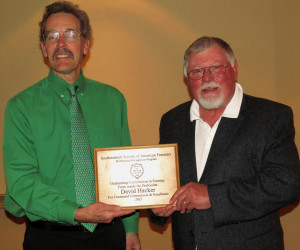
Courtesy Photo:
Highlands forestry professor David Hacker, right, receives the Outstanding C0ntribution to Forestry Award from Paul Sheppard, chair of the Southwestern Section of the Society of American Foresters.
Las Vegas, New Mexico – The Southwestern Section of the Society of American Foresters tapped a Highlands University professor for its Outstanding Contribution to Forestry Award.
Forestry professor David Hacker earned the recognition.
“For nearly 30 years, David Hacker has made an unusually strong contribution to the body of knowledge in forestry, in particular the forest management of the southern Rocky Mountains,” said Paul Sheppard, chair of the Southwestern Section of the Society of American Foresters (SAF). “David has a particular research passion for forest wildlife management.”
Sheppard, an environmental forestry professor at the University of Arizona, said Hacker is notable for both his technical research in forestry and longtime dedication to teaching at Highlands.
“He’s also shown leadership in being the adviser for the student chapter of the Society of American Foresters at Highlands. This early professional involvement puts the forestry students’ learning into a broader national context, and helps prepare them for successful careers in the field,” Sheppard said.
Sheppard added that the Highlands students are impressive when they participate in the meetings for the Southwestern Section of SAF, which encompasses New Mexico and Arizona.
“It’s encouraging to see knowledgable and well prepared young foresters like these Highlands students coming into the profession,” Sheppard said.
Hacker earned his Ph.D. in forestry from Stephen F. Austin State University in Nacogdoches, Texas, in 1989 and joined the Highlands faculty in 1994. He retires at the end of spring semester 2016.
“Clearly for me, the most rewarding part of my career at Highlands has been working with the students and seeing them grow into well-prepared professionals,” Hacker said. “It’s especially gratifying to see intelligent, highly motivated students who come to Highlands unprepared for college succeed academically.”
Over the years at Highlands, Hacker chaired the Natural Resources Management Department three times. He taught courses such as forest management, forest soils, wildlife habitat and applied statistics.
“My lab is the great outdoors, and gives my students real-world experience in the management of our nation’s natural resources,” Hacker said.
He said one of the biggest highlights of his time at Highlands was the successful accreditation of the forestry program by the Society of American Foresters in 2013.
Highlands has the only accredited forestry program in New Mexico and the only accredited forestry program in the country at a designated Hispanic-Serving Institution.
Hacker helped direct the forestry accreditation process, including the self-study report. Other forestry faculty who helped with accreditation include Craig Conley and former professor Sara Brown. Natural resources management professors Edward Martínez and Ken Bentson also played a role in the accreditation.
“These faculty are extremely dedicated to student achievement and are highly regarded by their academic peers throughout the country. They provide unique opportunities for hands-on classroom learning and fieldwork in nearby forests,” Hacker said.
He said accreditation assures that the Highlands forestry students are getting a high-quality education.
“Accreditation also gives our students more scholarship opportunities as well making them more competitive in the job market. Many state forestry agencies only hire graduates of accredited programs, and larger private sector employers also prefer these students,” Hacker said.
He added that the growing forestry program at Highlands has a strong track record of its graduates landing jobs.
“More than 90 percent of our forestry graduates attain professional job placement in their chosen field,” Hacker said.
He said another highlight of his tenure at Highlands was bringing in more than $1.3-million in grant funding for from sources such as the U.S. Department of Agriculture, U.S. Forest Service and National Science Foundation.
“These grants primarily funded research for forestry faculty and students. Some funding was earmarked for recruitment and retention,” Hacker said.
